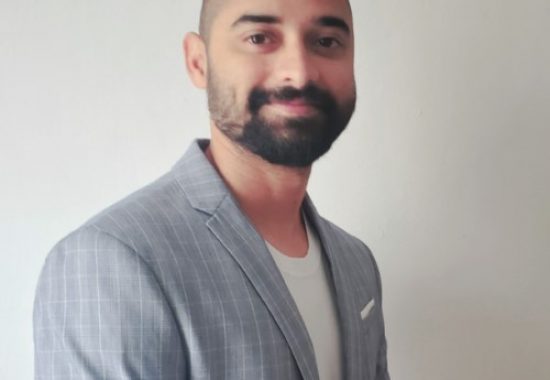Abhijeet Patra, PhD, joined Moss Rehabilitation Research Institute (MRRI) as a postdoctoral fellow at the end of 2018. During his time at MRRI, he has conducted exceptional research in the Language and Learning Laboratory. As Dr. Patra prepares to wrap up his postdoctoral training and begin his new position at Manchester Metropolitan University, we were pleased to have an opportunity to speak with him about his career and his experiences at MRRI.
1. How did you first get interested in science and rehabilitation research?
I remember that when I was in high school, I went to visit a relative who was undergoing treatment in a rehabilitation hospital. After completing high school, I explored different career options, but I was not really sure which direction to go. However, I think my experience that day in the hospital made me lean more towards a career in rehabilitation. Especially, after seeing the dedication of the clinicians working in that rehabilitation hospital, I wanted to have a career where I could help people after injury and improve their quality of life. After completing a clinical undergraduate degree in speech-language therapy and audiology, I decided to pursue a master’s degree in cognitive science. During my master’s degree, I gained further knowledge about the relationship between brain and behavior and how brain injury or stroke can impact that relationship. Once I completed my master’s degree, I decided to pursue a PhD to further continue my research in the rehabilitation field. I received my PhD from the University of Reading, UK in 2018, and I am glad that my PhD research work involved patients from the same region (Kolkata, India) where I started my career as a clinician.
2. Why did you choose to come to MRRI for a postdoctoral fellowship?
Throughout my academic career, I have read multiple impactful research articles written by MRRI scientists and that’s why MRRI was always on the top of my list. After completing my PhD, I was looking for research opportunities which would be more translational, and I came across the work of Erica Middleton, PhD (my current postdoctoral mentor). I started reading her papers and was fascinated by her simple yet powerful approach to rehabilitation. One day, I decided to write an email to Dr. Middleton. I discussed my research interests and my background with her, and that’s how it all started.
3. What has it been like working at MRRI?
I believe that my decision to come to MRRI has been one of the best decisions in my life. From day one, I have continued learning new and valuable things. All the scientists, research assistants, and staff at MRRI are wonderful, and they are always there to help. There is a very supportive and vibrant work culture at MRRI, and I feel that my postdoctoral mentors, lab members, and all the MRRI people are like my family.
4. What are some of the key questions you are focusing on in your research?
My postdoctoral work has focused mainly on three key areas: 1) how to improve naming impairments in people with aphasia using psychological learning principles, 2) understanding the changes in brain waves when an individual with aphasia produces common naming errors (e.g., saying cat instead of dog) and how that understanding may lead to better understanding of such impairment, and 3) understanding the relationship between sentence comprehension and cognitive control (e.g., inhibiting prepotent responses, working memory) in healthy adults and people with aphasia.
5. What have been some of the findings of your work?
In one of our studies, we found that people with aphasia make more naming errors when we asked them to name common everyday objects which belong to the same semantic category (e.g., dog, cat, elephant) versus objects from multiple semantic categories (e.g., dog, table, orange). However, one day later, that performance was reversed such that greater effort during training provided greater learning opportunities and led to better performance in future. During COVID-19 last year, we ran a web-based study on healthy young adults where participants read sentences word-by-word and also performed various cognitive control tasks. Our results provide evidence to support that cognitive control modulates sentence processing in healthy adults. We are currently writing the report to submit to a journal, and we also have plans to replicate these findings. These are only a few of the findings from my work, and I am looking forward to analyzing the results of a variety of other studies in the pipeline.
6. In terms of your research, what is the next step or something new you are excited to begin working on?
I am currently in the process of designing two electroencephalogram (EEG) experiments that I wanted to start last year but could not do due to COVID-19. I am looking forward to finally being able to get these studies going. In one of the experiments, I will look at the changes in brain activity during word production in people with aphasia. In the second, I will be examining the changes in brain activity during sentence processing in people with aphasia.
7. Thinking about the big picture, can you describe some of the impacts or potential impacts of your research?
During my PhD, I examined the characteristics of language breakdown in Bengali-English bilinguals with aphasia. Despite Bengali being the sixth most spoken language in the world, there were very few studies in the aphasia literature at that time when I started my PhD. I feel that through my PhD work I was able to contribute to broadening the sparse literature in this area. I have done some exciting research as a postdoc at MRRI, and I am still working on several projects. I think the output of my postdoctoral research will help the rehabilitation community better understand the relationship between cognitive control and language processing in aphasia and how to improve language impairments in those population.
8. What experiences or skills from your fellowship at MRRI do you think will be most important as you transition into your first faculty position?
I have learned many skills during my fellowship at MRRI that I feel will be important in my future job position. However, I would say following are the top four in my list: 1) experience in writing grant proposals, 2) communicating research ideas and results to people outside my field, 3) how to manage a lab, and 4) how to successfully manage my time and work on multiple projects at the same time.
9. Can you share one of your favorite memories from your time at MRRI?
I think it will be my first lab/postdoctoral get together at my mentor Dr. Middleton’s place. I had a really good time with everyone there, but I would like to mention one particular experience from that day. For most of my life, I was afraid of dogs and would avoid them if I could. However, I was surprised to discover that I really liked Dr. Middleton’s dog when I had a chance to spend time with the dog at her house. After this enjoyable encounter, I have decided to get a dog for myself someday.
10. Outside of research, what are some of your favorite pastimes or interests?
I am a fan of cricket, a very popular sport in India that is not as well-known in the U.S. I enjoy watching cricket games as well as playing tournaments. I also love cooking and experimenting with different cuisines.



One comment on “Interview with MRRI Postdoctoral Fellow Abhijeet Patra”